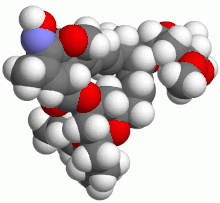This is the current revision of this page, as edited by Whywhenwhohow (talk | contribs) at 06:03, 26 December 2024 (infobox). The present address (URL) is a permanent link to this version.
Revision as of 06:03, 26 December 2024 by Whywhenwhohow (talk | contribs) (infobox)(diff) ← Previous revision | Latest revision (diff) | Newer revision → (diff) Topical parasiticide for dogs and catsPharmaceutical compound
 | |
 | |
| Clinical data | |
|---|---|
| Trade names | Revolution, Stronghold, Revolt |
| Other names | 25-cyclohexyl-25-de(1-methylpropyl)-5-deoxy-22,23-dihydro-5-(hydroxyimino)-avermectin B1 monosaccharide |
| AHFS/Drugs.com | International Drug Names |
| License data |
|
| Routes of administration | Topical |
| ATCvet code | |
| Legal status | |
| Legal status |
|
| Identifiers | |
| CAS Number | |
| PubChem CID | |
| ChemSpider | |
| UNII | |
| ChEMBL | |
| CompTox Dashboard (EPA) | |
| ECHA InfoCard | 100.250.168 |
| Chemical and physical data | |
| Formula | C43H63NO11 |
| Molar mass | 769.973 g·mol |
| 3D model (JSmol) | |
SMILES
| |
InChI
| |
| (what is this?) (verify) | |
Selamectin, sold under the brand name Revolution, among others, is a topical parasiticide and anthelminthic used on dogs and cats. It treats and prevents infections of heartworms, fleas, ear mites, sarcoptic mange (scabies), and certain types of ticks in dogs, and prevents heartworms, fleas, ear mites, hookworms, and roundworms in cats. It is structurally related to ivermectin and milbemycin. Selamectin is not approved for human use.
Veterinary uses
Selamectin is applied topically. It is not miscible in water.
Mode of action
| This section does not cite any sources. Please help improve this section by adding citations to reliable sources. Unsourced material may be challenged and removed. (February 2024) (Learn how and when to remove this message) |
Selamectin disables parasites by activating glutamate-gated chloride channels at muscle synapses. Selamectin activates the chloride channel without desensitization, allowing chloride ions to enter the nerve cells and causing neuromuscular paralysis, impaired muscular contraction, and eventual death.
The substance fights both internal and surface parasitic infection. Absorbed into the body through the skin and hair follicles, it travels through the bloodstream, intestines, and sebaceous glands; parasites ingest the drug when they feed on the animal's blood or secretions.
Side effects
Selamectin has been found to be safe and effective in a 2003 review.
Selamectin has high safety ratings, with less than 1% of pets displaying side effects. In cases where side-effects do occur, they most often include passing irritation or hair loss at the application site. Symptoms beyond these (such as drooling, rapid breathing, lack of coordination, vomiting, or diarrhea) could be due to shock as a result of selamectin killing heartworms or other vulnerable parasites present at high levels in the bloodstreams of dogs. This would be a reaction due to undetected or underestimated infections prior to using the medication, rather than an actual allergic reaction to the drug itself.
Society and culture
Brand names
| This section does not cite any sources. Please help improve this section by adding citations to reliable sources. Unsourced material may be challenged and removed. (February 2024) (Learn how and when to remove this message) |
Selamectin is sold under various brand names including Selehold, manufactured by KRKA, Selarid manufactured by Norbrook Laboratories Limited, Revolution and Stronghold manufactured by Zoetis, Revolt manufactured by Aurora Pharmaceuticals, and Senergy manufactured by Virbac.
Similar products
| This section does not cite any sources. Please help improve this section by adding citations to reliable sources. Unsourced material may be challenged and removed. (February 2024) (Learn how and when to remove this message) |
Main rival products for dogs include ivermectin (trade names Stromectol, Ivermec and others) or milbemycin oxime (Interceptor) for heartworms, imidacloprid and moxidectin (Advocate), fipronil (Frontline) or lufenuron (Program) for fleas, or the combination milbemycin oxime/lufenuron (Sentinel) for both.
References
- Bishop BF, Bruce CI, Evans NA, Goudie AC, Gration KA, Gibson SP, et al. (August 2000). "Selamectin: a novel broad-spectrum endectocide for dogs and cats". Veterinary Parasitology. 91 (3–4): 163–176. doi:10.1016/s0304-4017(00)00289-2. PMID 10940519.
{{cite journal}}: CS1 maint: overridden setting (link) - ^ "Revolution- selamectin solution". DailyMed. 1 December 2023. Retrieved 6 February 2024.
- "Evicto EPAR". European Medicines Agency. 1 August 2019. Retrieved 26 June 2024.
- "Evicto PI". Union Register of medicinal products. 23 July 2019. Retrieved 26 December 2024.
- "Stronghold EPAR". European Medicines Agency. 25 March 2008. Retrieved 29 June 2024.
- "Stronghold PI". Union Register of medicinal products. 3 December 1999. Retrieved 26 December 2024.
- Pipano E (2003). "Recent Developments In The Control Of Ectoparasites And Endoparasites Of Dogs And Cats With Selamectin". Israel Journal of Veterianry Medicine. 58 (2–3). Archived from the original on 14 April 2008. Retrieved 5 July 2008.
| Antiparasitics – Anthelmintics (P02) and endectocides (QP54) | |||||||||||||||
|---|---|---|---|---|---|---|---|---|---|---|---|---|---|---|---|
| Antiplatyhelmintic agents |
| ||||||||||||||
| Antinematodal agents (including macrofilaricides) |
| ||||||||||||||
| |||||||||||||||